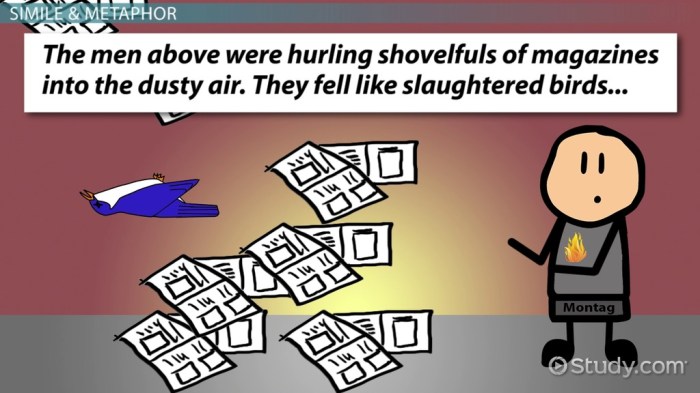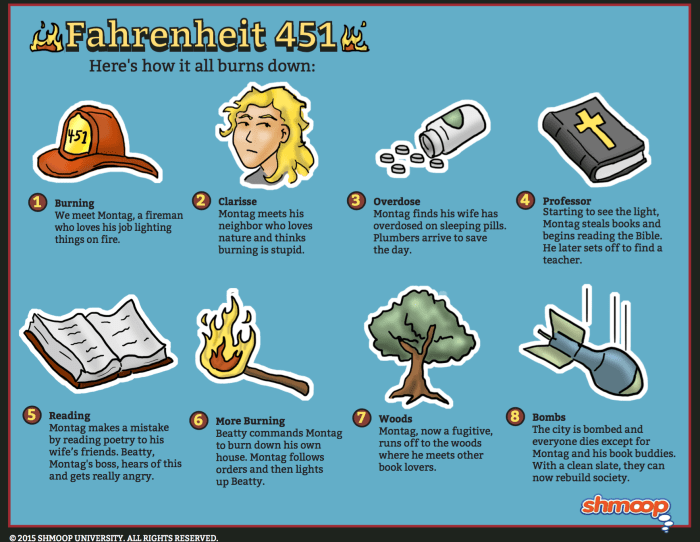Hyperbole in fahrenheit 451 with page numbers – In Ray Bradbury’s dystopian masterpiece, Fahrenheit 451, hyperbole emerges as a powerful literary device, shaping the novel’s themes, characters, and social commentary. This analysis delves into the concept of hyperbole, identifying specific examples within the text and examining their impact on the narrative.
Hyperbole, the deliberate exaggeration or overstatement for emphasis, serves a multifaceted purpose in Fahrenheit 451. It intensifies emotions, highlights societal flaws, and underscores the absurdity of a world where knowledge is feared and suppressed.
Hyperbole in Fahrenheit 451: Hyperbole In Fahrenheit 451 With Page Numbers

Hyperbole, a literary device involving exaggeration or overstatement, plays a pivotal role in Fahrenheit 451 by Ray Bradbury. Its purpose is to emphasize, create impact, and provoke thought by employing extreme language that transcends literal truth.
Bradbury utilizes hyperbole extensively to convey the oppressive and dystopian nature of the novel’s society. For instance, the description of Montag’s house burning as “a Roman candle exploding into golden stars” (p. 54) vividly captures the intensity and destructiveness of the fire, reflecting the societal destruction of knowledge and individuality.
Hyperbole also enhances characterization. Montag’s obsession with books is portrayed through his hyperbolic declaration, “I’m a bookburner, and I’m not! I don’t know what I am” (p. 121), highlighting his internal conflict and confusion.
Furthermore, hyperbole serves as a social commentary, criticizing censorship and the suppression of knowledge. The Firemen are depicted as “walking tombs” (p. 29), a hyperbolic metaphor that symbolizes their emptiness and lack of intellectual curiosity, reflecting the novel’s critique of a society that stifles independent thought.
Throughout the novel, hyperbole evolves as Montag’s perspectives shift. Initially, he uses hyperbole to express his dissatisfaction with society, such as his hyperbolic description of his wife Mildred as “a silly empty woman” (p. 22). However, as he embraces the power of books, his hyperbole becomes more hopeful and defiant, as seen in his declaration, “There is no terror in the bang, only in the anticipation of it” (p.
133).
The Use of Hyperbole in Characterization
Hyperbole in the Development of Montag
Hyperbole is central to the characterization of Montag. It highlights his growing disillusionment and rebellion against the oppressive society. For instance, his hyperbolic description of the mechanical hound as “a black cobra” (p. 63) reflects his fear and determination to defy its authority.
Hyperbole in Portraying the Firemen
Hyperbole effectively portrays the Firemen and their relationship with society. Their actions are described with exaggerated language, such as “they hated the world” (p. 29), emphasizing their destructive and oppressive nature. This hyperbole creates a sense of fear and alienation, reflecting the Firemen’s role as enforcers of societal norms.
Hyperbole in Characterizing the Dystopian World
Hyperbole contributes significantly to the overall characterization of the dystopian world in Fahrenheit 451. Bradbury uses hyperbolic language to exaggerate the societal flaws, such as the “powdered ashes” (p. 54) left after the burning of books, which symbolize the destruction of knowledge and intellectualism.
Hyperbole as a Reflection of Social Commentary

Criticism of Censorship and Suppression of Knowledge
Hyperbole in Fahrenheit 451 serves as a powerful tool for social commentary. Bradbury uses hyperbolic language to highlight the dangers of censorship and suppression of knowledge. For example, the description of the Firemen as “anti-intellectuals” (p. 29) emphasizes the novel’s critique of societies that suppress independent thought.
Exposure of Societal Flaws and Absurdities, Hyperbole in fahrenheit 451 with page numbers
Hyperbole also exposes the flaws and absurdities of the totalitarian society in Fahrenheit 451. The hyperbolic description of the “Seashell Radio” (p. 103) as a device that “can pump you full of knowledge” reflects the shallow and mindless consumption of information in the society.
The Evolution of Hyperbole Throughout the Novel

Development and Evolution of Hyperbole
Hyperbole in Fahrenheit 451 undergoes significant development as the novel progresses. Initially, hyperbole is used to express Montag’s frustration and disillusionment with society. However, as he embraces the power of books, his hyperbole becomes more hopeful and defiant, reflecting his growing rebellion against the oppressive regime.
Hyperbole and Montag’s Changing Perspectives
The evolution of hyperbole mirrors Montag’s changing perspectives and experiences. His initial hyperbolic descriptions of the Firemen as “murderers” (p. 63) reflect his fear and hatred towards them. However, as he gains a deeper understanding of their humanity, his hyperbole becomes more nuanced, acknowledging their own victimhood.
Significance of the Shift in Hyperbole
The shift in hyperbole from the beginning to the end of the novel symbolizes Montag’s journey of self-discovery and transformation. His initial hyperbole reflects his anger and frustration, while his later hyperbole reflects his newfound hope and determination to fight against the oppressive regime.
Helpful Answers
What is the purpose of hyperbole in Fahrenheit 451?
Hyperbole serves to emphasize emotions, highlight societal flaws, and underscore the absurdity of the dystopian world.
How does hyperbole contribute to characterization in the novel?
Hyperbole helps develop Montag’s character, portraying the Firemen, and contributing to the overall characterization of the dystopian world.
What social and political issues are criticized through hyperbole in Fahrenheit 451?
Hyperbole criticizes censorship, suppression of knowledge, and the flaws of a totalitarian society.